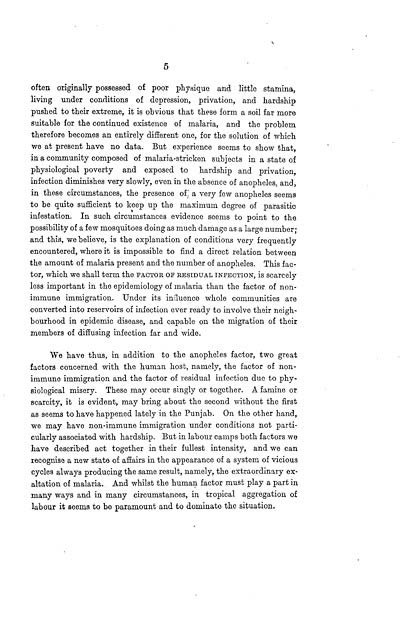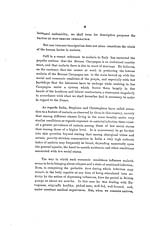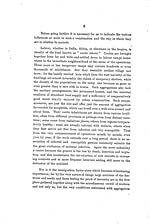Medicine - Disease > Malaria in the Duars
(13) Page 5
Download files
Individual page:
Thumbnail gallery: Grid view | List view

5
often originally possessed of poor physique and little stamina,
living under conditions of depression, privation, and hardship
pushed to their extreme, it is obvious that these form a soil far more
suitable for the continued existence of malaria, and the problem
therefore becomes an entirely different one, for the solution of which
we at present have no data. But experience seems to show that,
in a community composed of malaria-stricken subjects in a state of
physiological poverty and exposed to hardship and privation,
infection diminishes very slowly, even in the absence of anopheles, and,
in these circumstances, the presence of a very few anopheles seems
to be quite sufficient to keep up the maximum degree of parasitic
infestation. In such circumstances evidence seems to point to the
possibility of a few mosquitoes doing as much damage as a large number;
and this, we believe, is the explanation of conditions very frequently
encountered, where it is impossible to find a direct relation between
the amount of malaria present and the number of anopheles. This fac-
tor, which we shall term the FACTOR OF RESIDUAL INFECTION, is scarcely
less important in the epidemiology of malaria than the factor of non-
immune immigration. Under its influence whole communities are
converted into reservoirs of infection ever ready to involve their neigh-
bourhood in epidemic disease, and capable on the migration of their
members of diffusing infection far and wide.
We have thus, in addition to the anopheles factor, two great
factors concerned with the human host, namely, the factor of non-
immune immigration and the factor of residual infection due to phy-
siological misery. These may occur singly or together. A famine or
scarcity, it is evident, may bring about the second without the first
as seems to have happened lately in the Punjab. On the other hand,
we may have non-immune immigration under conditions not parti-
cularly associated with hardship. But in labour camps both factors we
have described act together in their fullest intensity, and we can
recognise a new state of affairs in the appearance of a system of vicious
cycles always producing the same result, namely, the extraordinary ex-
altation of malaria. And whilst the human factor must play a part in
many ways and in many circumstances, in tropical aggregation of
labour it seems to be paramount and to dominate the situation.
often originally possessed of poor physique and little stamina,
living under conditions of depression, privation, and hardship
pushed to their extreme, it is obvious that these form a soil far more
suitable for the continued existence of malaria, and the problem
therefore becomes an entirely different one, for the solution of which
we at present have no data. But experience seems to show that,
in a community composed of malaria-stricken subjects in a state of
physiological poverty and exposed to hardship and privation,
infection diminishes very slowly, even in the absence of anopheles, and,
in these circumstances, the presence of a very few anopheles seems
to be quite sufficient to keep up the maximum degree of parasitic
infestation. In such circumstances evidence seems to point to the
possibility of a few mosquitoes doing as much damage as a large number;
and this, we believe, is the explanation of conditions very frequently
encountered, where it is impossible to find a direct relation between
the amount of malaria present and the number of anopheles. This fac-
tor, which we shall term the FACTOR OF RESIDUAL INFECTION, is scarcely
less important in the epidemiology of malaria than the factor of non-
immune immigration. Under its influence whole communities are
converted into reservoirs of infection ever ready to involve their neigh-
bourhood in epidemic disease, and capable on the migration of their
members of diffusing infection far and wide.
We have thus, in addition to the anopheles factor, two great
factors concerned with the human host, namely, the factor of non-
immune immigration and the factor of residual infection due to phy-
siological misery. These may occur singly or together. A famine or
scarcity, it is evident, may bring about the second without the first
as seems to have happened lately in the Punjab. On the other hand,
we may have non-immune immigration under conditions not parti-
cularly associated with hardship. But in labour camps both factors we
have described act together in their fullest intensity, and we can
recognise a new state of affairs in the appearance of a system of vicious
cycles always producing the same result, namely, the extraordinary ex-
altation of malaria. And whilst the human factor must play a part in
many ways and in many circumstances, in tropical aggregation of
labour it seems to be paramount and to dominate the situation.
Set display mode to: Large image | Zoom image | Transcription
Images and transcriptions on this page, including medium image downloads, may be used under the Creative Commons Attribution 4.0 International Licence unless otherwise stated. ![]()
| India Papers > Medicine - Disease > Malaria in the Duars > (13) Page 5 |
|---|
| Permanent URL | https://digital.nls.uk/74558636 |
|---|




